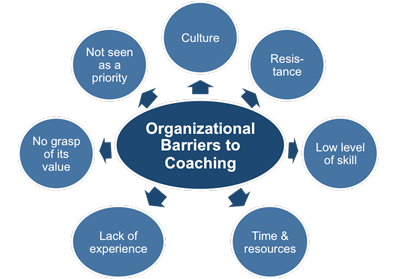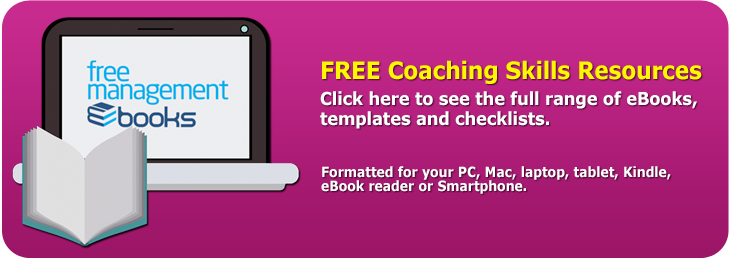Organizational Barriers to Coaching
Whatever the nature of your organization, its culture and ethos will have an impact on your ability to perform as a coach. The Chartered Institute of Personnel and Development (CIPD), Europe's largest HR development professional body, has conducted research into the organizational barriers to effective coaching.
It provides you with insight into why some organizations are reluctant or unable to implement effective internal coaching.
 |
The following list highlights the barriers that the research identified as preventing an organization from maximizing the benefits of coaching as a way to develop their personnel:
• The organizational culture
• Lack of understanding of the value of coaching
• Not seen as a priority for the business
• Resistance from senior management
• Low levels of skills and experience within the organization
• Lack of time and resources
You need to assess how extensive these barriers are in your own organization when deciding if coaching is the right form of learning. If the organization has the majority of these barriers you may find that attempting to use coaching will have a detrimental rather than motivational effect.
So before you start the coaching process you need to judge whether or not the organizational barriers are too strong for you to be successful. You can assess the extent of each barrier within your organization by asking yourself the following questions.
Is the organizational culture conducive to coaching?
If you are working in an organization where the existing leadership method is that of telling individuals how things are to be done and where everything is driven by 'red tape' you will find that the organization conflicts with the principles of coaching conflict. This constitutes the single largest barrier to successful coaching.
Where an organization's leaders are unsupportive, often managing by dictating and using threats to gain short-term productivity, the overall culture makes it very difficult to integrate coaching principles into your team development efforts.
The benefits of coaching can only be realized if the organization's leadership are prepared to take a long-term view of staff development. This aspect of the culture will be reflected in the resources allocated to training and development, as well as the nature of remuneration and promotion policies.
Is the value of coaching understood?
In many organizations the senior management do not appreciate or understand what coaching can achieve. They are therefore unable to perceive that it can be a cost-effective way in which to develop their personnel.
The management are unable to recognize the different levels at which coaching can achieve improvements and productivity - for example, the role of the executive coach compared with the role of the line manager as a coach.
The overall perception of coaching can also be that it brings no 'real' benefits to the organization. It is often viewed as a time-wasting activity and therefore the senior team do not actively listen to individuals who attempt to implement coaching activities for their teams.
What level of priority does the organization assign to coaching?
Many organizations pay lip service to coaching, assigning it a low priority. This can be because they see it as only one of the tools a manager can use in their overall learning and development strategy. This belief ensures that coaching is positioned as part of a wider culture change process rather than an isolated development activity.
Is there a resistance to coaching?
Resistance to coaching often arises from a belief within the organization that coaching is only for those who are poor performers. It can also arise from the behaviors shown by senior management. Where employees see that senior management are reluctant to use internal coaches, and that they encourage an attitude of assigning a low priority to coaching activities, they will be resistant to undertake coaching themselves.
What levels of skills and experience exist internally?
The level of coaching expertise and skill amongst managers varies considerably. For coaching to be successful the organization must establish the style or use of a model that becomes an embedded aspect of the organization's management. This model should also provide a means whereby established processes and procedures can be questioned in a structured way by encouraging the coachee's own ideas and thinking.
An essential aspect for success is the recognition of coaching as one the core leadership skills your organization wants to promote in its managers. This will take time to create and needs someone to own the coaching process. Their role is to manage, resource, promote, maintain, and communicate with a pool of coaches.
What resources are available?
Organizations need to view coaches within their organization as they do any other valued resource. The senior management have to provide sufficient and appropriate funds to ensure that their coaches can perform the role well and achieve the desired results.
What time pressures exist?
Part of the resourcing process has to be providing managers with the opportunity to free up their time to allow enough to perform the role of coach for their team or others in the organization. The coach must be willing and able to commit the necessary time to coach an individual. Those who say 'I don't have enough time' are not showing the right attitude to this process.
In situations where there is little or no flexibility in adjusting managers' high workloads so that they can perform the role of a coach, the organization will not be able to realize the benefits of coaching.
The fundamental belief within an organization must be that coaching opportunities occur with every interaction. If the ethos in an organization is that coaching can only be formal and structured then a lot of opportunities will be missed.
If you decide to introduce coaching as part of your own management style then you should think about doing it gradually. This avoids it being seen by your team as a new fad or as something that you have just attended a course on.
The first steps you could take include:
• Practicing active listening
• Developing effective question skills:
To replace giving instructions
To encourage participation in meetings and discussions
• When giving feedback allow time to ask for the team members' own perceptions
You cannot eradicate all of the barriers to coaching in your organization but by viewing each conversation or discussion you have as an opportunity to improve people's skills, you can maximize the personal development within your team.
You may also be interested in:
Management Coaching Skills and Models | Coaching and Active Listening | Asking Questions in a Coaching Session | Coaching and Goal-setting | Giving Feedback to the Coachee | Building Rapport with the Coachee | Demonstrating Empathy and Using Intuition in Coaching | Coaching Models and 'The Inner Game' | The GROW Coaching Model | The TGROW Coaching Model | The OSKAR Coaching Model.



